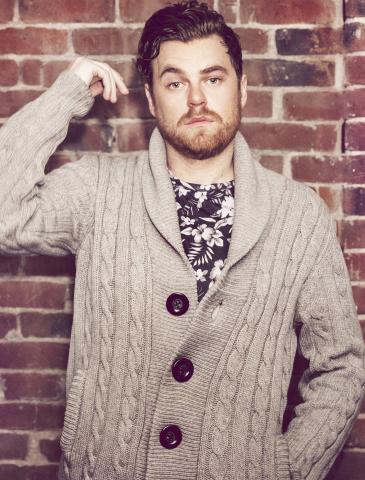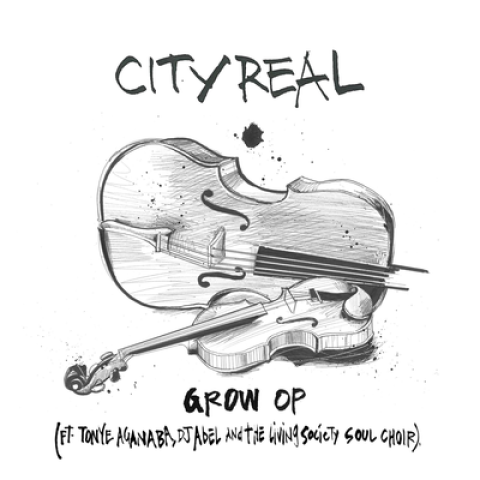
His latest single, “Grow Op,” is about growing up, not growing pot. The follow-up, “Here for You,” due out before the end of the year, features singer and cancer survivor Bif Naked and proceeds will go to BC Cancer.
Cityreal talked to Samaritanmag about overcoming addiction, taking care of his mother, his view on safe injection sites, doing motivational talks and his other plans.
How did you come about “Grow Op” as a title – it has nothing to do with a pot-growing operation?
I thought it was a cool double entendre because the song is a statement about wanting personal growth and wanting, for lack of a better term, to grow up. I do like to contradict myself a little bit in my music because I am somewhat of a contradiction. I’m still struggling to be the person I want to be.

It was more a personal struggle with my addictions and I’m still taking it one day at a time. I tried to escape the depression and feeling down all the time. It was self-medicating to a certain degree. I’ve definitely relapsed a couple of times.
At the same time, you were dealing with your mother’s illness. Did you have help?
BC Cancer was a tremendous help, not only with their oncologist-care, but helping with end-of-life care and stuff like that, making her as comfortable as possible, along with the North Shore Hospice Society. [They made it possible] so my mom could stay at home and die at home. The fact that I was an artist and was able to take so much time off of work [made the decision easier]. In terms of all that help we got from BC Cancer in terms of not only nurses but, literally, supplies and stuff from the Red Cross and everything, she was able to die comfortably in her own bed surrounded by her family and things. That was what she wanted. But even before that, I’d had difficulties with alcohol abuse and partying too much and cocaine and stuff. I guess I wasn’t a stranger to substance abuse. Getting off oxy [oxycodone] was definitely quite the experience.
That’s a painkiller. What were you taking it for?
I hurt my back and started abusing it and continued to take it outside of my prescription. That was when my mom was dying. I was carrying around my mom, to and from the washroom and stuff like that and I hurt myself doing that. To be honest, at a certain point I started using it as a stress reliever, considering the inevitable death that was coming, to solve the stress in my life. When my mom passed away, it was pretty accessible so I fell into it for several months.
Have you met with other people, maybe fans, who have also had drug and alcohol issues and been able to point them in the right direction? What do you say to them?
I've met tons of people that have been afflicted by substance abuse and addiction throughout my life. Growing up in Vancouver, it's hard not to be surrounded by it at times. I've seen everyone from friends, to fans and people at shows, to people I used to consider my biggest music industry mentors, go through the depths of addiction. I even grew up being consistently reminded that my grandfather is an alcoholic, so later on the fact that I turned to marijuana at an early age created a serious lifelong a rift between my father and I, probably since he grew up negatively affected by his father's alcohol abuse.
So pretty safe to say I've experienced it quite a bit. In terms of advice to give other people, as a young person, it's hard for anyone who hasn't personally experienced addiction to offer any other advice then just saying the stereotypical "you should lay off that stuff" or something along those lines. As I grew up and became wiser, I clearly realized that substance abuse is basically always caused by deeper underlying issues and a desire to numb certain feelings surrounding personal issues. So as I grew wiser, I stopped focusing on the substance abuse itself and now I usually try to find out why the individual I'm speaking to is prone to wanting to escape their reality. My curiosity lies more around what feelings they're trying to run from or temporarily numb in other words. I think once person realizes what they're running from, only then can they start to truly deal with her substance-abuse issue.

I have always been strongly opposed to the laws that surround substance abuse and addiction. I feel the laws and practice of criminalizing addicts are extremely immoral and completely ignorant to the cause and effects of drug abuse and addiction in our society. Even though I always empathized with those deeply afflicted by addiction, getting older and having gone through similar experiences has made me able to empathize even more than before. Furthermore, since an adolescent age, I was disgusted by my father's complete lack of empathy and understanding surrounding this issue. He is amongst those who simply blame the dysfunction associated with addicts on their use of drugs with no concept of why people turn to drugs or alcohol. Having experienced all that, I now simply try and act as a positive support and positive reinforcement in terms of making people feel good about themselves and making them feel hopeful about the future and possibility of a better more sober existence.
Do you plan to do speaking engagements or talk to young people, either about drug abuse or to help others who are caregivers to family members or grieving the loss of someone close to them from cancer?
Yes, I've only very recently been approached with the opportunity to do so and it excites me quite a bit. I would love to help others that are afflicted by substance abuse and addiction in as many ways as possible, and bringing them hope, as well as showing that someone actually cares is amongst the best things anyone can do, whether it be going to high schools and talking about the dangers of addiction, or the necessity to empathize with those that are struggling, which it's looking like I'll likely be doing soon. However, hopefully I can also go to rehab centers or halfway houses or youth drop-in centers and talk directly to people who are still struggling with substance abuse. I would seriously like to make them feel more hopeful about the future and remind them that many people care about their life.
It must have been hard to return to creating music. What got you back on track?
I was really inspired by this book called In The Realm of Hungry Ghosts. It’s by the author Gabor Maté about his experiences as the head physician at the safe injection site in Vancouver. He was the pioneer doctor that supported that whole initiative, the harm-reduction strategy and everything like that. So I’ve been a big fan of him for a while. Before I even dealt with my personal struggles I was a political science student and I’ve always had an affinity towards lefty politics, NGO’s (Non-Governmental Organizations) and such. That whole book [showed me that] addiction can be applied on a wider sense.
In what way?
His great comparison that I really love is that he compares an addiction to drugs to people who are addicted to profit and power – the negative effect that that has on this planet. How you can compare the negative effect on the planet that the CEO has when he further damages the environment for the sake of profit, compared to someone who sells half and ounce of cocaine on the Downtown Eastside.
Not every city in Canada has safe injection sites. Why do you think they are a good idea vs. getting people into rehab?
Actually, safe injection sites and a rehab go together hand-in-hand. In Vancouver is a safe injection site which is called "in-site;" there is also a detox facility called "on-site" which refers and places detox patients into many different rehab facilities. It's definitely not viewed in terms of safe injection versus getting people into rehab, as the safe injection site does not act as a deterrent to rehab whatsoever. It in fact makes the rehabilitation and detox services much more available to those afflicted by intravenous drug use addiction since it's literally right upstairs. Furthermore, you have a nursing staff present it is ready to recommend and help with detox and rehab after someone shows even the slightest inkling of wanting to get clean.
The safe injection site was created to prevent the spread of disease caused by sharing needles. The rate of infectious disease spread such as HIV and hepatitis C has been drastically reduced since the creation of the safe injection site. Before the creation of the safe injection site, Vancouver in downtown Eastside had an HIV rate comparable to Third World African nations, such as Botswana during it's AIDS crisis. The availability of clean needles has been the major change maker and, in fact, the change has almost eliminated the risk factor of disease spread. Furthermore, especially now with the prevalence of fentanyl, many lives are saved daily from overdosing because of people injecting drugs directly in front of a nursing staff that are ready to deal with an overdose at a moment's notice. But bottom line, the safe injection site acts as an institution that encourages and provides detox and rehab facilities therefore it is essentially the opposite of a rehab deterrent.
What is next for you, artistically?
We’ve just finished a grant application for a video to accompany the next single, “Here for You.” It was one of the first songs I ever wrote, but it has really evolved. It was written six or seven years ago when my mom’s breast cancer first reappeared. It was written from a perspective of when she was successfully winning her battles with cancer, going through the treatments. The song really evolved with time because my mom’s cancer progressed and she actually got the same oncologist as [West Coast punk icon and breast cancer survivor] Bif Naked. So I got Bif Naked on the song. We’ll release it as a single and all proceeds for that will go to BC Cancer or to BC Cancer [specifically] for breast cancer research.
When will we be able to see and hear that?
Probably by the end of the year.
And the album?
There’s no solid date for the album. Probably the end of the year as well. It depends on the next few singles.
(with original reporting by Samaritanmag's Perry Stern)
nike roshe split blue hero size 8 women jeans